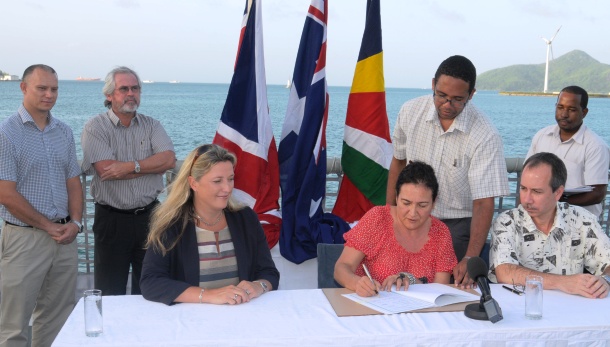
Australia has formally joined the Regional Anti-Piracy Prosecutions and Intelligence Coordination Center (RAPPICC), based in the Seychelles. This move further bolsters the international coalition combatting piracy in the region.
The agreement was signed this past Tuesday evening by Joel Morgan, Minister of Home Affairs and Transport in the Seychelles, and Sandra Vegting and Lindsay Skoll, high commissionser from Australia and the United Kingdom. The ceremony took place aboard the HMAS Newcastle, an Adelaide-Class guided-missile frigate from the Australian Royal Navy. The ship was docked in Victoria, Seychelles, while on a half-year mission code-named “Operation Slipper,” in which the ship will patrol the Indian Ocean and Gulf of Aden to fight piracy, terrorism and drug trafficking.
One of the important aspects of this agreement is the Memorandum of Understanding signed between Australia and the Seychelles, that will result in the transfer of any prisoners captured by Australian vessels to jails on the small island nation.
After the ceremony, Minister Morgan spoke about the importance of having Australia as a part of RAPPICC and how it brings the entire organization to another level in the fight against piracy:
“Pirates are now feeling the heat, not only because of RAPPICC but also because of vessels like the HMAS Newcastle which are patrolling the Indian Ocean. Piracy has hit hard against Seychelles economy by affecting the maritime industry at a difficult time when we were carrying measures as part of the economic reform program. But thanks to our determination we have been able to successfully combat the threat. RAPPICC is the recognition of the international community of Seychelles’ efforts in this area.”
Minister Morgan continued to remind everyone that there is no room for complacency, despite recent success:
“That is why we welcome Australia into RAPPICC. Seychelles has been very active in incarcerating pirates and transferring them back to Somalia. With the help of our partners, we will continue to take our responsibility to make sure that whoever is responsible faces justice.”
Sandra Vegteg, the high commissioner from Australia, shared her thoughts on the deal:
“I am delighted to be signing this Memorandum of Understanding and the RAPPICC partnership agreement today on board the Australian warship HMAS Newcastle that is visiting the Seychelles for this occasion. The humanitarian, security and trade impacts of piracy in the Indian Ocean are a great concern for Australia and the international community. The Australian Civilian Corps deployment to the RAPPIC will make a valuable contribution to the high priority objective of combating Indian Ocean piracy.”
This isn’t Australia’s first episode of bilateral cooperation with Seychelles. The country has already helped Seychelles People’s Defense Forces personnel conduct training exercises. Australia has also sent a legal specialist from the Australian Civilian Corps to aid the professional development of those participating in the RAPPICC and elsewhere in the government of the Seychelles.
Vegteg reiterated that her country is excited to join the Seychelles, the United Kingdom, and other international organizations such as UNODC to fight piracy. With the decline in number of piracy incidents, recent emphasis has been put on capacity building of local nations to bolster their ability to maintain maritime domain awareness and security.